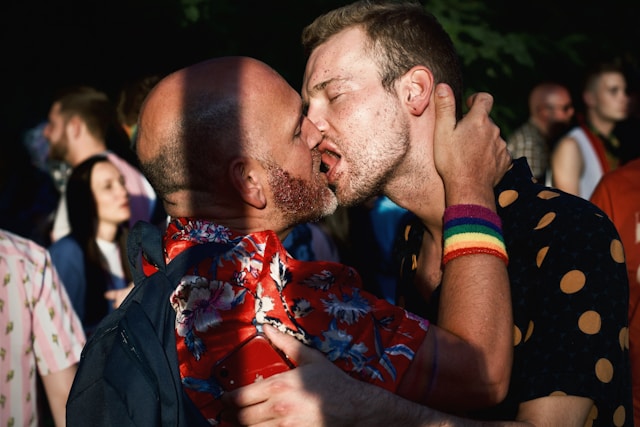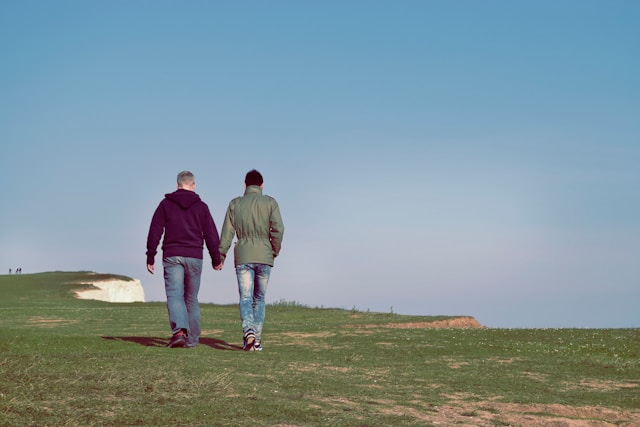The Evolution of the Gay Community in the UK: A 50-Year Journey

Table of Contents
- The Early Days: A Time of Secrecy
- The 1980s: A Decade of Struggle
- The 1990s to Early 2000s: Steps Toward Equality
- The Present Day: A Time of Progress
- Pioneering LGBTQ+ Figures Who Advanced Societal Acceptance
- Future Outlook for the Gay Community in the UK
- Looking Forward: The Future of the Gay Community in the UK
The journey of the gay community in the UK over the past 50 years is a testament to the resilience, courage, and determination of those who have fought for acceptance and equality. From a time of fear and secrecy to today’s broader acceptance, the evolution of the LGBTQ+ scene in the UK is truly remarkable.
The Early Days: A Time of Secrecy
Fifty years ago, the situation for gay and bisexual people in the UK was drastically different from what it is today. The decriminalization of homosexuality in 1967 was a significant step forward, but societal acceptance was still a long way off. The gay community was largely forced to remain underground, with secret clubs and meeting places that provided a rare safe haven for those seeking connection. Discrimination was rampant, and the fear of being outed often led to lives lived in the shadows.
The 1980s: A Decade of Struggle
The 1980s marked a turbulent time for the gay community in the UK. The AIDS crisis brought fear, stigma, and tragedy, particularly affecting gay and bisexual men. The media often portrayed the gay community in a negative light, and this period saw a backlash against the progress that had been made. However, it was also a time of activism. The formation of groups like the Terrence Higgins Trust and the rise of the gay rights movement began to challenge public perceptions and push for greater acceptance.
The 1990s to Early 2000s: Steps Toward Equality
As the UK entered the 1990s, attitudes towards the gay community began to shift. The age of consent for gay men was lowered in 1994, and in 2000, it was finally equalized with that for heterosexuals. This period also saw the introduction of civil partnerships in 2004, providing same-sex couples with legal recognition and many of the same rights as married heterosexual couples. The visibility of the gay community in UK culture increased, with more representation in media and public life, signaling a growing acceptance of diversity.
The Present Day: A Time of Progress

Today, the gay community in the UK enjoys a level of acceptance that would have been unimaginable 50 years ago. Same-sex marriage has been legal since 2014, and anti-discrimination laws have been strengthened to protect LGBTQ+ individuals. The UK is now home to vibrant gay scenes in cities like London, Manchester, and Brighton, where pride events are celebrated with enthusiasm and widespread support. Despite this progress, challenges remain, and the fight for full equality continues, but the trajectory of the last 50 years offers hope and inspiration.
Pioneering LGBTQ+ Figures Who Advanced Societal Acceptance
Here are some famous pioneers who played significant roles in advancing the acceptance of the LGBTQ+ community in society:
-
Peter Tatchell - A British human rights activist who has tirelessly campaigned for LGBTQ+ rights since the 1970s, leading numerous protests and campaigns.
-
Sir Ian McKellen - The renowned actor, known for his roles in "The Lord of the Rings" and "X-Men," is also a vocal advocate for LGBTQ+ rights and a co-founder of Stonewall, a leading LGBTQ+ charity in the UK.
-
Alan Turing - The famous mathematician and cryptanalyst who contributed to the breaking of the Enigma code during World War II. His persecution for being gay led to a posthumous apology and pardon from the British government, symbolizing a recognition of LGBTQ+ rights.
-
Angela Mason - A leading LGBTQ+ activist who served as the director of Stonewall from 1992 to 2003, playing a crucial role in advocating for legal equality.
-
Stephen Fry - A well-known British author, actor, and broadcaster who uses his platform to advocate for LGBTQ+ rights and combat discrimination.
These individuals have made significant contributions through their courage, visibility, and relentless efforts to promote the societal acceptance of the LGBTQ+ community in the UK.
Future Outlook for the Gay Community in the UK

The future of the gay community in the UK looks promising, but it will likely continue to be shaped by ongoing challenges and evolving societal dynamics. Here’s a glimpse of what might be ahead:
-
Increased Visibility and Representation: As more LGBTQ+ individuals occupy prominent roles in politics, media, and business, the visibility and representation of the gay community in UK society will continue to grow. This increased presence will help normalize diverse sexual orientations and identities, further embedding acceptance into the cultural fabric.
-
Legal and Social Advances: The UK is likely to see further advancements in LGBTQ+ rights, potentially including more comprehensive protections against discrimination, improved healthcare access tailored to the needs of the gay community, and greater support for mental health. These legal and social changes will contribute to a more inclusive society.
-
Cultural Shifts and Education: The emphasis on LGBTQ+ education in schools and awareness campaigns will likely continue, fostering a generation that is more accepting and understanding of diversity. This cultural shift will contribute to reducing stigma and discrimination over time.
-
Challenges from Conservative Movements: While progress is expected, there may still be resistance from conservative or traditionalist groups. This could result in periods of backlash or attempts to roll back certain rights, making it crucial for the gay community and its allies to remain vigilant and proactive in defending hard-won gains.
-
Global Influence and Solidarity: The UK’s gay community may increasingly play a role on the global stage, advocating for LGBTQ+ rights in less accepting regions. This could foster international solidarity and inspire change beyond the UK’s borders.
Overall, while challenges remain, the trajectory for the gay community in the UK is one of continued progress and growing acceptance. The community's resilience, combined with supportive legal frameworks and shifting cultural attitudes, suggests a future where equality and inclusion are further strengthened.
Looking Forward: The Future of the Gay Community in the UK
The evolution of the gay community in the UK over the last 50 years is a powerful reminder of how far society has come in terms of acceptance and equality. While there is still work to be done, the progress made is a source of pride for the community and a beacon of hope for the future. The UK’s gay community is now an integral part of the country’s social fabric, and its continued growth and development promise to shape the next 50 years in even more positive ways.
In summary, the journey of gays in the UK—from secrecy to celebration—reflects the broader societal shifts in attitudes towards sexuality. As we look ahead, the ongoing efforts to promote acceptance and equality for all will continue to define the evolution of the UK’s gay community.
Write a reply
Related Posts

The Most Famous Gay Men in the World: Inspiring Lives, Love Stories, and Iconic Moments
When discussing famous gay men, it’s impossible not to recognize the immense contributions they’ ...

Gay sex dating - Why Are Gays Often More Relaxed and Quick When It Comes to Sex?
In the world of dating, there’s one thing that often stands outgay men tend to approach sex and da ...

The Gay-Friendly Hotels in England: Top 10 Picks for an Inclusive Stay
If you're planning a trip to the UK and want to ensure that your stay is not only comfortable but al ...

Discovering the Best Gay Locations in London: A Friendly Guide to the Capital's LGBTQ+ Scene
London is a diverse and vibrant city, offering a warm embrace to anyone who walks its bustling stree ...